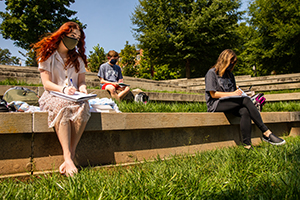What are the requirements to major in English?
All English majors take four upper-level classes in literature and culture across the centuries, exposing them to the textual foundations of America, Britain, and the Anglophone world.
The six remaining courses depend on their concentrations. They can choose from four options to focus their English studies: Creative Writing, Literature, Rhetoric and Writing, and Technical Communication.
The Concentrations
Creative Writing
(see the required coursework here)
Creative writers develop their imaginations and learn how to tell stories in engaging ways. They explore the diversity of creative genres, from fiction to poetry to screenwriting to nonfiction. They cultivate their ability to describe the world in startling ways and create compelling visions of life as it is and as it should be.
Literature
(see the required coursework here)
Literature buffs dive deep into the cultures of English-speaking nations. They understand how stories shape the way we think and they can explain and communicate what various texts mean. They make forceful arguments about how we should interpret the data, and they offer surprising insights by using their robust analytic skills.
Rhetoric and Writing
(see the required coursework here)
The rhetoricians are particularly attentive to genres of writing and how to tailor communication to effectively address diverse audiences. They understand how to build persuasive arguments with a mixture of logic, feeling, and ethical force. They know writing inside out and how most fittingly to get a point across to other people.
Technical Communication
(see the required coursework here)
The tech communicators know the importance of precision in writing for the sciences and other specialized fields. They organize information like pros and understand how to present data and text efficiently and effectively. They make technical details accessible, appreciative that knowledge can’t advance without clear communication.
Double Concentrations
Students may choose to pursue two of the above concentrations. To do so, they must take at least four distinct courses (12 hours) in the additional concentration. One course may overlap between the two concentrations. For details on this option, please talk to our English advisor, Kirsten Pitcock (kpitcock@utk.edu).
Highly motivated students with a specific vision for coursework, and sponsored by a faculty member, may also devise their own Individualized Program Concentration.
Declaring English

Declare the Major or Minor Here
Use this English major curriculum checklist to ensure you have the correct prerequisites and number of hours to complete your degree.
If you have questions about requirements for the major or the concentrations, please reach out to our dedicated English advisor, Kirsten Pitcock at kpitcock@utk.edu.
Forms
- Petitions (we highly recommend consulting with your English advisor or the Director of Undergraduate Studies about petitioning courses)
- Independent Study Form
- Earning Academic Credit for an Internship
- Sample Internship Proposal
- Sigma Tau Delta English Honors Society Application

